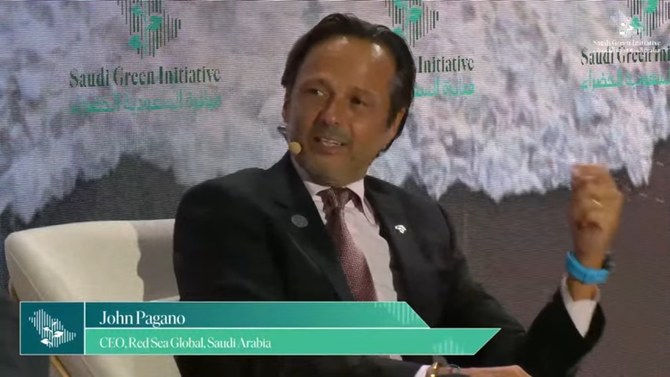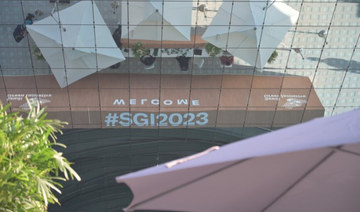RIYADH: The Kingdom’s Saudization initiative is not merely a policy but a transformative strategy aimed at reshaping the national workforce and bolstering economic prosperity.
Also referred to as the Saudi Nationalization Scheme, the policy was implemented by the Ministry of Labour in 2011, requiring Saudi companies to hire a set quota of their country’s citizens.
The Nitaqat aspect of the initiative focuses on increasing the percentage of Saudi citizens working in private enterprise and reduce the employment gap with the public sector.
This aligns closely with the government’s Vision 2030, which seeks to empower nationals and enhance their participation in the private sector, thereby reducing dependence on oil revenue and fostering sustainable economic development.
Saudi-based economist Talat Hafiz highlighted in an interview with Arab News that Nitaqat is one of the most important programs that has enhanced participation in the labor market.
He added: “Nitaqat and Nitaqat Mutawar programs have improved the performance of the labor market through providing appropriate job opportunities for the Saudi national labor force in a safe and attractive working environment.”
Since its launch in 2011, Nitaqat has achieved significant milestones, effectively increasing the number of Saudi nationals in the private sector workforce. The latest figures released by the National Labor Observatory showed the number of Saudi nationals working in the private sector in June stood at 2.34 million – an increase of 16,598 since April.
This success is underscored by the proactive measures taken to support Saudization, including regulatory frameworks that incentivize companies to hire and retain local talent.
As a result, there has been a noticeable shift toward employing Saudi professionals who bring not only technical skills but also a deep understanding of local culture, business practices, and regulatory nuances.
Ahmed Boshnak, partner at Bain and Co., said: “One significant contribution of Saudization is the enhancement of local talent development. Through Saudization, there is a focused effort on education and vocational training programs that align with market needs.”
He added: “This equips Saudi nationals with the necessary skills to participate in various sectors, thus increasing their employment prospects and career advancement opportunities.”
Looking ahead
Saudi Arabia is anticipating a substantial influx of young graduates into the job market, with projections suggesting approximately 5 million new entrants by 2030.
Concurrently, the government aims to create 3 million new jobs in the private sector over the next decade, reinforcing its commitment to sustainable economic growth and reducing unemployment rates.
The benefits of hiring Saudi nationals extend beyond meeting regulatory requirements; they encompass leveraging local expertise to navigate business challenges effectively.
Saudi professionals’ proficiency in Arabic and familiarity with local resources facilitate streamlined operations and enhance organizational agility.
Hafiz said: “Saudi nationals have proven their capabilities in the local labor market because they better understand the culture of the Saudi labor market and they have proven to be very hard workers.”
He added: “I believe in the long run, hiring a Saudi citizen could be more effective and less costly to the businesses since businesses can avoid labor’s cost related to hiring non-Saudis.”
Moreover, integrating Saudi talent into the workforce fosters a sense of national pride and ownership, contributing to a more cohesive and productive corporate environment.
Boshnak said: “Saudization encourages private and public sector collaboration. The initiative requires companies to invest in local talent, promoting policies that support the hiring, training, and retention of Saudi nationals. This not only drives employment but also fosters a culture of inclusivity and sustainability within the workforce, leading to long-term economic stability.”
Complementing regulatory efforts, educational initiatives are pivotal in equipping Saudi youth with the skills necessary to thrive in a rapidly evolving job market.
The Fuel program, a collaboration between the Ministry of Communications and Information Technology, Saudi Digital Academy, and Coursera, exemplifies this commitment.
By offering tailored training in digital skills, the program aims to prepare 100,000 Saudi citizens annually for careers in emerging sectors critical to the Kingdom’s digital transformation.
“MCIT and SDA both have played a major role in enhancing Saudization since Saudi Arabia is shifting to digital economy and high tech, which requires huge numbers of Saudis,” Hafiz added.
Furthermore, the Human Resources Development Fund plays a crucial role in supporting Saudization through comprehensive programs that enhance the employability of Saudi nationals.
These initiatives include training, upskilling, and employment assistance, ensuring a steady supply of qualified talent for the private sector.
By collaborating closely with small and medium enterprises, HRDF has facilitated job creation and enhanced local businesses’ competitiveness across diverse sectors. HRDF aims to support job seekers in the private sector through the fund paying a proportion of the employee’s wages, according to its director general, Turki Al-Jawini.
Ryan Alnesayan, partner at Arthur D. Little, noted that from 2016 to 2023, the number of Saudis working in the private sector increased from 1.7 million to 2.3 million, with women’s participation in the workforce rising from 17 percent to 35.3 percent, surpassing the Saudi Vision 2030 target of 30 percent.
He added: “These figures underscore the Saudization initiative’s role in not just increasing employment but also enhancing the quality and diversity of the workforce, positioning Saudi nationals at the forefront of economic growth and development.”
Businesses also play a pivotal role in advancing Saudization by investing in recruitment strategies, HR training, and employee development initiatives.
Organizations like NADIA Global offer tailored solutions to attract, retain, and develop Saudi talent, thereby enhancing workforce capabilities and organizational resilience.
By prioritizing the development of local talent pools, businesses not only comply with Saudization regulations but also contribute to broader socio-economic objectives aimed at achieving sustainable growth and prosperity.
Hafiz noted: “The role of the regulatory frameworks, such as Nitaqat quotas and other programs, have played a significant role in improving Saudization because they have rewarded businesses who are in compliance with the Saudization programs.”
He added: “For example, HRDF has provided programs and products that allow the provision and exchange of guidance, training and empowerment services efficiently and effectively to increase the stability and development of the workforce in the Saudi labor market.”
Arthur D. Little is driving local talent development through initiatives like AFAQ, dedicated to Saudi nationals. Alnesayan explained, adding: “Our tailored mentorship and coaching programs focus not just on filling positions but on grooming future leaders. The goal is clear: attract and elevate Saudi talents to top-tier roles with specialized skills, setting new benchmarks in various industries.”
As Saudi Arabia continues its journey toward economic diversification and global competitiveness, the empowerment of Saudi nationals through Saudization remains a cornerstone of its strategic vision.
By nurturing a skilled and adaptable workforce, the Kingdom not only mitigates economic dependencies but also positions itself as a hub for innovation, entrepreneurship, and technological advancement in the region.
“The future potential of Saudi nationals in driving innovation and entrepreneurship is incredibly promising. Saudization is not just about increasing employment numbers; it’s about cultivating a generation of skilled, innovative leaders,” Alnesayan added.































